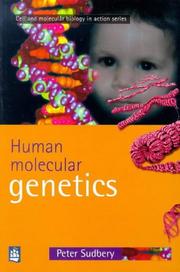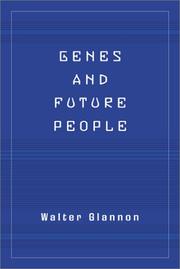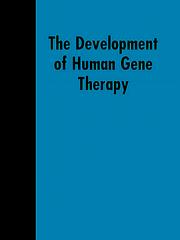| Listing 1 - 10 of 20 | << page >> |
Sort by
|

ISBN: 0824742354 Year: 2003 Publisher: New York (N.Y.) : Dekker,
Abstract | Keywords | Export | Availability | Bookmark
 Loading...
Loading...Choose an application
- Reference Manager
- EndNote
- RefWorks (Direct export to RefWorks)
Drug delivery systems. --- Gene therapy. --- Médicaments --- Thérapie génique. --- Administration --- Dispositifs.

ISBN: 0195059557 9780195059557 Year: 1997 Publisher: New York Oxford university press
Abstract | Keywords | Export | Availability | Bookmark
 Loading...
Loading...Choose an application
- Reference Manager
- EndNote
- RefWorks (Direct export to RefWorks)
The authors of this absorbing new book describe the science of gene therapy in terms easily accessible to the non-specialist, and focus on the controversial ethical and public policy issues surrounding human interventions in human heredity. After a brief survey of the structure and functions of DNA, genes, and cells, Walters and Palmer discuss three major types of potential genetic intervention: somatic cell gene therapy, germ line gene therapy, and genetic enhancements. They start with the current techniques of gene addition, using non-reproductive (somatic) cells in an effort to cure or treat disease. Next they address the technical problems and moral issues facing attempts to prevent disease through genetically modifying early human embryos or sperm and egg cells. These changes would be passed on to future generations. Chapter 4, in many ways the most original part of this volume, confronts the issue of employing genetic means to improve human abilities and appearance. Depending on the technique, such enhancements could affect not only the individuals receiving the intervention but their offspring as well. Three types of genetic enhancements are considered: physical alterations to improve size, reduce the need for sleep, and decelerate aging; intellectual enhancements of memory and general cognitive ability; and moral enhancements for control of violently aggressive behavior. The authors maintain that genetic modifications should be evaluated individually rather than be condemned in principle or as a group. The final chapter summarizes the public review process that human gene therapy proposals have been undergoing in the United States since 1990. Five appendices, providing technical background information along with a complete list of questions raised in the national public review process, supplement the discussion.
Professional ethics. Deontology --- Human medicine --- #GBIB:CBMER --- gentherapie --- verbetergeneeskunde (mensverbetering) --- genetische engineering (manipulatie, gentechnologie) --- somatische gentherapie --- kiemcel (kiemcellijn, embryonale kiemcel, germinale stamcel) --- thérapie génique --- médecine de l'amélioration (médecine d'amélioration) --- génie génétique (ingénierie, manipulation génétique) --- thérapie génique somatique --- cellule germinale (lignée germinale, cellule embryonnaire germinale, cellule souche germinale) --- Gene therapy --- Moral and ethical aspects. --- Moral and ethical aspects --- Therapy, Gene --- Genetic engineering --- Therapeutics --- Gene therapy - Moral and ethical aspects

ISBN: 0582322669 9780582322660 Year: 1998 Publisher: Harlow Longman
Abstract | Keywords | Export | Availability | Bookmark
 Loading...
Loading...Choose an application
- Reference Manager
- EndNote
- RefWorks (Direct export to RefWorks)
Human genetics --- Molecular biology --- Genetics, medical. --- Genome, human. --- Gene therapy. --- Medical genetics --- Human genome --- Génétique médicale --- Génome humain --- Thérapie génique --- 57.083 --- 575 --- DNA vingerafdruk --- Human Genome Project --- biologie --- celbiologie --- erfelijke ziekten --- genetica --- gentherapie --- menselijke biologie --- microbiologie --- moleculaire biologie --- Genetic Therapy. --- Génétique médicale --- Génome humain --- Thérapie génique --- Genetics, Medical. --- Genome, Human.
Periodical
Abstract | Keywords | Export | Availability | Bookmark
 Loading...
Loading...Choose an application
- Reference Manager
- EndNote
- RefWorks (Direct export to RefWorks)
Biotechnology --- Gene Therapy --- Drug Industry --- Legislation, Drug --- Gene therapy --- Pharmaceutical industry --- Drugs --- Biotechnologie --- Thérapie génique --- Industrie pharmaceutique --- Médicaments --- Periodicals. --- economics --- Periodicals --- Law and legislation --- Périodiques --- Droit --- Biotechnology. --- Genetic Therapy. --- Legislation, Drug. --- Gene therapy. --- Pharmaceutical industry. --- economics. --- Health Sciences --- Life Sciences --- Pharmacy and Pharmacology --- biotechnologie
Periodical
Abstract | Keywords | Export | Availability | Bookmark
 Loading...
Loading...Choose an application
- Reference Manager
- EndNote
- RefWorks (Direct export to RefWorks)
Immunology. Immunopathology --- Human genetics --- Immunogenetics --- Gene Therapy --- Immune System --- Genetica. --- Immuniteit. --- Gene therapy --- Immune system --- Immunogénétique --- Thérapie génique --- Periodicals. --- immunology --- Immunology --- Périodiques --- Immunogenetics. --- Gene Therapy. --- immunology. --- Agriculture Sciences --- Health Sciences --- Life Sciences --- Soil Chemistry, Microbiology, Fertility & Fertilizers --- Diagnostics --- Genetics --- Micro and Molecular Biology
Book
ISBN: 3540610766 3642802095 3642802079 Year: 1996 Volume: 218 Publisher: Berlin : Springer,
Abstract | Keywords | Export | Availability | Bookmark
 Loading...
Loading...Choose an application
- Reference Manager
- EndNote
- RefWorks (Direct export to RefWorks)
Adenoviridae --- Adenovirus --- Adenoviruses --- Adenovirussen --- Gene therapy --- Genetic vectors --- Genetische dragers --- Gentherapie --- Porteurs génétiques --- Relations virus-vecteurs --- Therapie [Gen] --- Therapy [Gene ] --- Thérapie génique --- Vecteurs-virus [Relations ] --- Vector-virus relationships --- Vectoren-virussen relaties --- Virus-vecteurs [Relations ] --- Virus-vector relationships --- Virussen-vectoren relaties --- Genetic Therapy --- Chromosomes, Human, Pair 19. --- Dependovirus. --- methods --- methods. --- Methods.

ISBN: 915544640X Year: 1999 Publisher: Uppsala : Almqvist & Wiksell : Acta universitatis upsaliensis,
Abstract | Keywords | Export | Availability | Bookmark
 Loading...
Loading...Choose an application
- Reference Manager
- EndNote
- RefWorks (Direct export to RefWorks)
615.375 --- Gene therapy --- -241.63*5 --- Therapy, Gene --- Genetic engineering --- Therapeutics --- Other immunizing agents. Gene therapy --- Moral and ethical aspects --- Theologische ethiek: bio-ethiek (bioethiek); genetische experimenten; transplantatie; eugenetica --- Moral and ethical aspects. --- 241.63*5 Theologische ethiek: bio-ethiek (bioethiek); genetische experimenten; transplantatie; eugenetica --- 615.375 Other immunizing agents. Gene therapy --- 241.63*5 --- Therapie genique

ISBN: 0813365600 0813365767 Year: 2001 Publisher: Cambridge Westview
Abstract | Keywords | Export | Availability | Bookmark
 Loading...
Loading...Choose an application
- Reference Manager
- EndNote
- RefWorks (Direct export to RefWorks)
Advances in genetic technology in general and medical genetics in particular will enable us to intervene in the process of human biological development which extends from zygotes and embryos to people. This will allow us to control to a great extent the identities and the length and quality of the lives of people who already exist, as well as those we bring into existence in the near and distant future. Genes and Future People explores two general philosophical questions, one metaphysical, the other moral: (1) How do genes, and different forms of genetic intervention (gene therapy, genetic enhancement, presymptomatic genetic testing of adults, genetic testing of preimplantation embryos), affect the identities of the people who already exist and those we bring into existence? and (2) How do these interventions benefit or harm the people we cause to exist in the near future and those who will exist in the distant future by satisfying or defeating their interest in having reasonably long and disease-free lives? Genes and Future People begins by explaining the connection between genes and disease, placing genetic within a framework of evolutionary biology. It then discusses such topics as how genes and genetic intervention influence personal identity, what genetic testing of individuals and the knowledge resulting from it entails about responsibility to others who may be at risk, as well as how gene therapy and genetic enhancement can affect the identities of people and benefit or harm them. Furthermore, it discusses various moral aspects of cloning human beings and body parts. Finally, it explores the metaphysical and moral implications of genetic manipulation of the mechanisms of aging to extend the human life span.The aim Genes and Future People is to move philosophers, bioethicists, and readers in general to reflect on the extent to which genes determine whether we are healthy or diseased, our identities as persons, the quality of our lives, and our moral obligations to future generations of people. The book is a sustained philosophical reflection on some of the metaphysical and moral issues presented by genetics and different forms of genetic intervention.
Human genetics --- Moral and ethical aspects. --- Philosophy. --- genetica (genen) --- genetische test (genetische zelftest) --- kloneren (klonen) --- gentherapie --- génétique (gènes) --- test génétique (autotest génétique) --- clonage --- thérapie génique --- Genetics --- Heredity, Human --- Human biology --- Physical anthropology --- Moral and ethical aspects --- Philosophy --- Moral and religious aspects

ISBN: 0226222624 0226222616 Year: 2002 Publisher: Chicago University of Chicago press
Abstract | Keywords | Export | Availability | Bookmark
 Loading...
Loading...Choose an application
- Reference Manager
- EndNote
- RefWorks (Direct export to RefWorks)
Technology evolves at a dazzling speed, and nowhere more so than in the field of genetic engineering, where the possibility of directly changing the genes of one's children is quickly becoming a reality. The public is rightly concerned, but interestingly, they have not had much to say about the implications of recent advancements in human genetics. "Playing God?" asks why and explores the social forces that have led to the thinning out of public debate over human genetic engineering. John H. Evans contends that the problem lies in the structure of the debate itself. Disputes over human genetic engineering concern the means for achieving assumed ends, rather than being a healthy discussion about the ends themselves. According to Evans, this change in focus occurred as the jurisdiction over the debate shifted from scientists to bioethicists, a change which itself was caused by the rise of the bureaucratic state as the authority in such matters. The implications of this timely study are twofold. Evans not only explores how decisions about the ethics of human genetic engineering are made, but also shows how the structure of the debate has led to the technological choices we now face. Technology evolves at a dazzling speed, particularly in the field of genetic engineering. But the public has not had much to say about the advancements in human genetics. This text asks why and explores the social forces that have led to the thinning out of public debate over genetic engineering.
genetische engineering (manipulatie) --- bio-ethiek (medische, biomedische ethiek, bio-ethische aspecten) --- gentherapie --- voortplanting (reproductie) --- génie génétique (ingénierie génétique) --- bioéthique (éthique médicale, biomédicale, aspects bioéthiques) --- thérapie génique --- procréation (reproduction) --- Bioethics. --- Genetic engineering --- Moral and ethical aspects. --- Bioethics --- Biology --- Biomedical ethics --- Life sciences --- Life sciences ethics --- Moral and ethical aspects --- Science

ISBN: 0879695285 9780879695286 Year: 1999 Publisher: Cold Spring Harbor Cold Spring Harbor laboratory press
Abstract | Keywords | Export | Availability | Bookmark
 Loading...
Loading...Choose an application
- Reference Manager
- EndNote
- RefWorks (Direct export to RefWorks)
The idea of human gene therapy was accepted by the medical community and society at large long before believable clinical benefits began to emerge. In this book, some of the field's most distinguished contributors chronicle the evolution of this momentous direction for medicine, illustrating how imaginative concepts shaped the development of technologies and brought the daring new idea to its current position of imminent practical success. This is a book designed to endure as clinical advances accumulate, a clear-eyed work of reference that will anchor the further development of this revolution in therapy. It is an essential addition to libraries of clinical medicine, biotechnology, and public policy, and a resource that no laboratory investigator with an interest in the biology of gene transfer should be without. This text chronicles the evolution of human gene therapy, illustrating how imaginative concepts shaped the development of technologies. It should be of interest to those interested in clinical medicine, biotechnology and the biology of gene transfer.
Gene therapy. --- Human genetics. --- Gene therapy --- Human genetics --- Therapy, Gene --- Genetics --- Heredity, Human --- Human biology --- Physical anthropology --- Genetic engineering --- Therapeutics --- Adenoviruses. --- Genetic vectors. --- Genetic Therapy --- Adenoviridae --- Gene Transfer Techniques --- Genetic Vectors --- Thérapie génique. --- Génétique humaine. --- Adénovirus. --- Vecteurs de clonage. --- Vecteurs génétiques.
| Listing 1 - 10 of 20 | << page >> |
Sort by
|

 Search
Search Feedback
Feedback About UniCat
About UniCat  Help
Help News
News